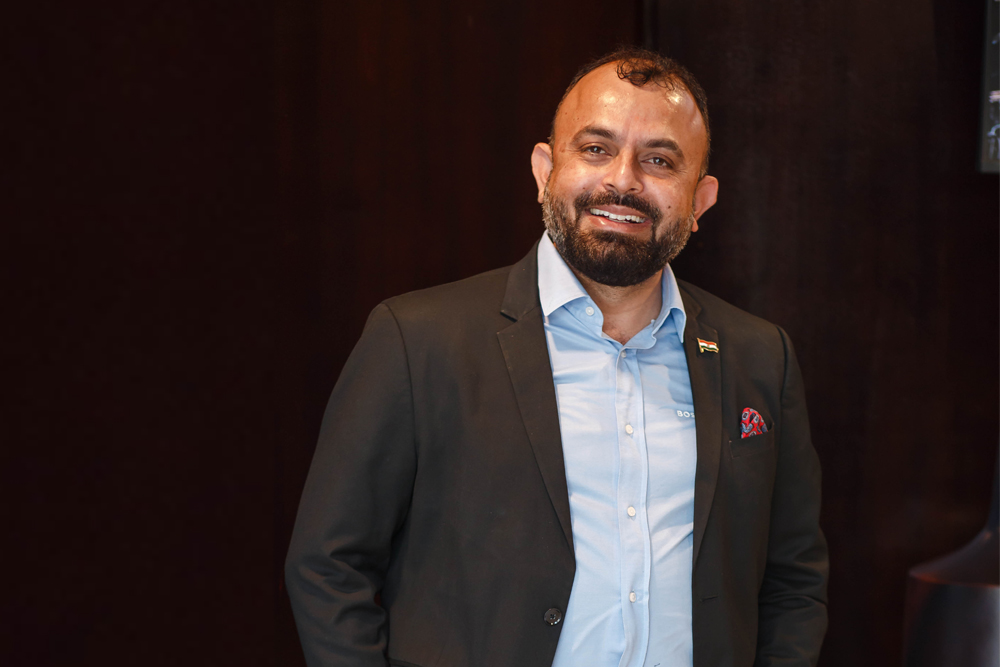
Two-time winner of Entrepreneurs Organisation Nepal Global Student Entrepreneur Award in 2013 and 2014, Ritesh Marwadi started his event management career in 2011. He officially founded We Fear Silence in 2012. He dropped out of his undergrad studies due to high professional commitments and eventually obtained a Bachelors degree in Business Administration.
“My first ever job was at Prime Life Insurance where I worked for three months with a stipend of Rs 2970. It was a great learning period as I was placed in Kirtipur and I had to sell life insurance policies to people who were already struggling for their basic needs,” says Ritesh. He adds, “But I did well and that’s when I decided I want to start something of my own. I got involved in event management and in 2012 officially founded WFS.”
Ritesh also invested in a coffee shop called Mr. Beans which closed down as he could focus on only one business, and his passion lay in event management. In early 2016, he started KTMLIVE Entertainment since he needed a more mature brand name in order to get into corporate events and BTL marketing. He then initiated Tktmonkeys.com, an online ticketing platform, in late 2017. This platform is under its final construction phase before they launch an app. And in recent days, Ritesh has taken over a 44 year old pub in Thamel called KC’s Restaurant & Bar.
In this issue of B360, Dibesh Dangol interviewed Ritesh Marwadi to know about the current events scene, the mantra behind his success, and the values every event management company must follow. Excerpts
What are the challenges and risks involved in your line of work?
There are a lot of challenges and risks. Mainly it’s regarding venues. If we are to invite bigger artists, Nepal still doesn’t have a venue that can hold 3,000 – 5,000 people. Therefore, whenever there is a renowned artist coming, there is very limited space for entries. If the ticket price is expensive, people don’t turn up. Often times, we are sold out but a lot of people turn up on the event day itself wanting tickets. Because the existing clubs aren’t made for huge scale events, the security of the artists becomes questionable at times. Getting legal permission also takes a lot of time and as we don’t have insurance services for any natural calamity or unavoidable circumstances, insurance of events is still a dream in this sector.
There were plenty of event management companies when you started WFS in 2012 and the numbers are growing even now. Where does that place WFS in differentiating itself?
One of the main reasons for starting a company is definitely money, but for us it’s not the first thing we look at. We are very passionate about what we do and we want to deliver an experience in the first place. Even if the cost is high, we never compromise on this aspect. People spend their money to have good time and we want to make sure every penny spent is worth the value.
What differences or changes have you witnessed in events since 2012? What are the trends?
Nightlife and events have drastically increased in the past 5-6 years. Many professional event companies have entered the market organizing events with great success. A lot of clubs and lounges are coming up and each one is getting better than the other in terms of quality.
In the coming days, we can definitely expect a lot of international artists and performers to come to Nepal. We hope with the establishment of new nightclubs and event venues, international events can be organised.
What are the key criteria for successfully operating an event management company?
Never compromise on what you want to deliver to the crowd.
Never allow free entries. I strongly believe people need to pay for their own entertainment, like they pay for alcohol and movie tickets so that they can understand the value we are delivering.
Have a core team of limited people with different but specific jobs so that work is divided and led by each one in their areas. Have people who are passionate and are self-driven as nightlife events are not easy at all.
Always have a checklist two days prior to the event and have a back-up plan of things that might occur. Example: Rain can cause the event to be postponed, or announce beforehand if the artist turns sick.
In your past interviews, you have said that huge risks are involved in bringing international artists to Nepal. What are these risks?
With the recent cases of the cancellations of a few of the international artists, it’s really hard to believe who are actually coming to perform and who are not. The legal permissions for organising the event and the security systems are a few major hindrances.
What I have witnessed is people’s heightened interest to party and celebrate every weekend or whenever an international artist is performing. Kathmandu is definitely ready for some nightlife madness, but outside Kathmandu, it will still take some time for the trend to follow.


.jpg)


